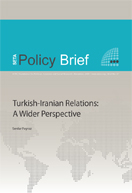Turkey might play a role in reintegrating the Iranian state into the international system. Turkey’s initiatives may have a moderating influence on the Iranian state and would, in any case, be a better policy route to choose rather than a direct confrontation.Turkey might play a role in reintegrating the Iranian state into the international system. Turkey’s initiatives may have a moderating influence on the Iranian state and would, in any case, be a better policy route to choose rather than a direct confrontation. It is a good sign for Iran and Turkey that the volume of trade between the two countries increased from $1.3 billion in 2002 to $10 billion in 2008. Iran is also be seen as a natural gateway by the Turkish state in order to reach into the markets of Central Asia and Pakistan. These kinds of Turkish political and economic initiatives will not only serve the interests of the Turkish and Iranian states but also have the potential to replace the aggressive military rhetoric of Western countries in dealing with Iran if the ultimate aim is to re-include Iran into the world economy and moderate its behavior. In addition, a more peaceful future for Iraq depends on reintegrating Iran with the rest of the world. Hence, the wiser course of action for western countries is to follow the Turkish example of engagement with Iran using diplomacy rather than issuing military and economic threats
The nature of Turkish-Iranian relations today, and the future characteristics these relations might take, can only be understood within the broader context of Middle Eastern Politics. The region’s politics and Turkey’s role in it have become increasingly dynamic and complex since the end of the Cold War. As Bülent Aras and Hakan Fidan argue, the current Turkish government has adopted a decidedly more active foreign policy than previous Turkish governments.1 However, the current Turkish government’s policies towards Iran reflect significant continuity with the policies of the Turkish governments throughout the 1980s and 1990s. As Daphne McCurdy observes, “Turkey has always viewed Iran, unlike other Middle Eastern countries, as a large and important nation state that must be managed rather than confronted.”2 Turkish willingness to “manage” rather than “confront” Iran, as a policy, goes back to Ottoman times, and today, continues to be a sine qua non for Turkey’s foreign policy vision. However, this general Turkish tendency and preference for diplomacy and management when it comes to Iranian affairs is not enough to help us understand the profound changes that are also taking place in Turkey’s foreign policy with regard to the Middle East in general and Iran in particular.
Change of Strategies in the Middle East: Turkey, Iran and Israel Talking about Turkish foreign policy in the Middle East between the 1950s and the early 1990s is a bit like talking about the plot of a pretentious art movie: Nothing happened really. Turkey as an integral part of the NATO and the Western alliance was defending the southern flank of the NATO against the threat of Communism projected from the Soviet Union. The political game at the time was the “peripheral policy” of Israel devised by David Ben-Gurion.3According to this peripheral policy, Israel, the main ally of the U.S. in the region, devised alliances with the states that were in the periphery of the Middle East, such as Iran, Turkey, and Ethiopia, against the neighboring Arab states such as Egypt, Syria and Iraq, which were directly or indirectly supported by the Soviet Union. The general contours of the peripheral strategy of Is
In this article
- Domestic Policy
- 1950
- 1980
- 1990
- 2002
- 2008
- Central Asia
- Cold War
- Egypt
- Hakan Fidan
- Iraq
- Islamic Republic of Iran
- Israel
- Middle East
- NATO
- Pakistan
- Perspective
- Relations
- SETA
- Soviet Union | Union of Soviet Socialist Republics (USSR)
- Syria
- Syrian Civil War
- Syrian Conflict
- Syrian Crisis
- Turkish Foreign Policy
- Turkish-Iranian
- Türkiye's Foreign Policy
- United States (US)
- Western Countries
- Western World
- Wider


